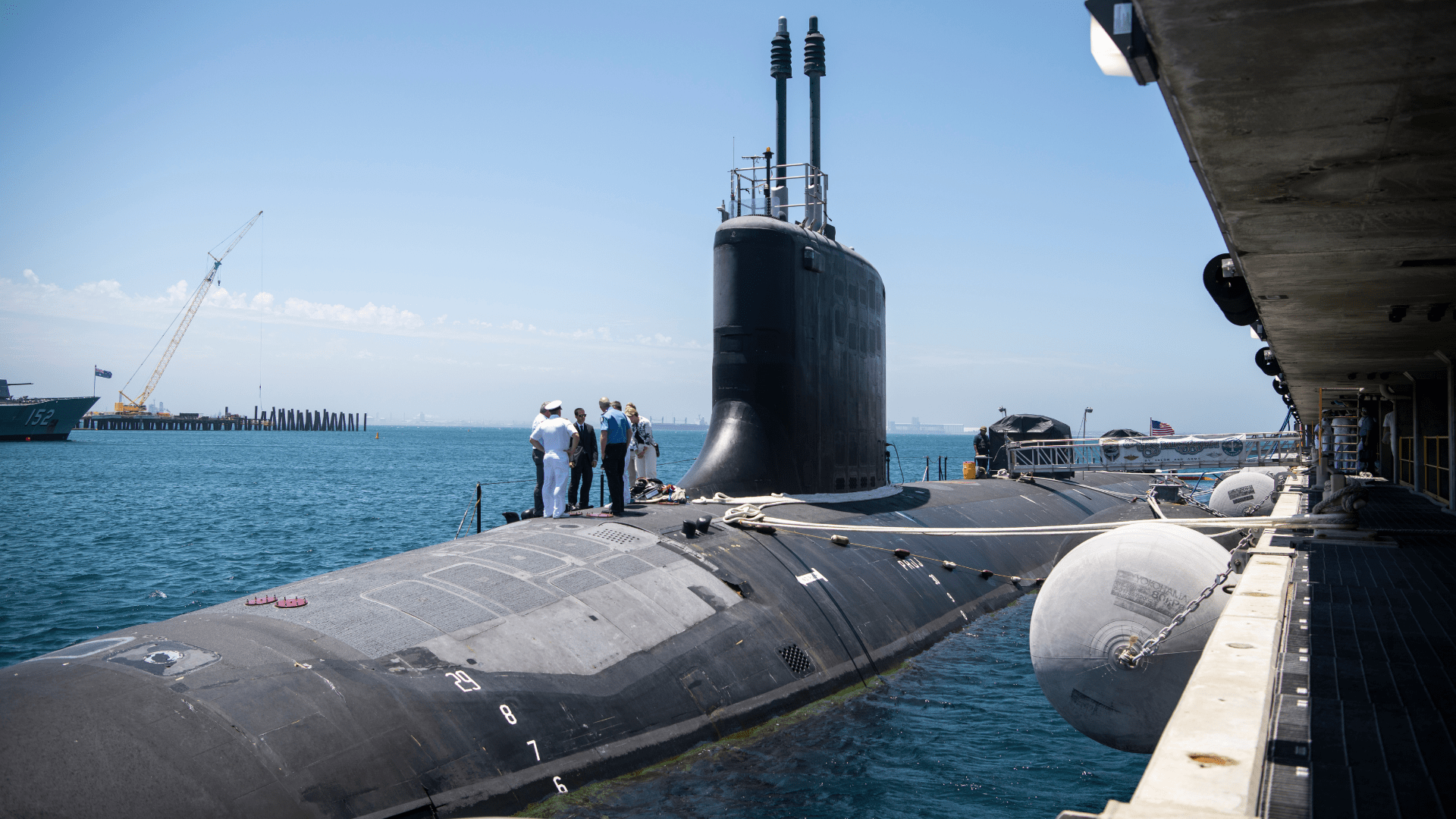On April 9, at the Navy League’s Sea-Air-Space 2024 exposition, leaders from the AUKUS partnership reaffirmed their commitment to enhancing joint military capabilities to ensure peace and stability in the Indo-Pacific.
—
AUKUS Prioritizes Stability in the Indo-Pacific
The AUKUS security partnership, formed between the United States, the United Kingdom, and Australia in September 2021, is taking a significant leap forward with a focus on developing joint capabilities to ensure stability in the Indo-Pacific region.
Senior officials from all three nations recently emphasized this core objective during a panel discussion at the Navy League’s Sea-Air-Space 2024 exposition.
“It’s really about maintaining peace and stability in the Indo-Pacific,” declared Justin McFarlin, deputy assistant secretary of defense for international and industry engagement at the Pentagon.
This overarching goal guides the partnership’s multi-phased approach, which includes bolstering Australia’s undersea capabilities and fostering technological collaboration among all three members.
A Two-Pillar Approach to Strengthening Defense
AUKUS operates through two key pillars.
The first equips Australia with three nuclear-powered Virginia-class submarines to replace its aging diesel-electric fleet by the 2030s.
On April 9, at the Navy League’s Sea-Air-Space 2024 exposition, leaders from the AUKUS partnership reaffirmed their commitment to enhancing joint military capabilities to ensure peace and stability in the Indo-Pacific.
—
AUKUS Prioritizes Stability in the Indo-Pacific
The AUKUS security partnership, formed between the United States, the United Kingdom, and Australia in September 2021, is taking a significant leap forward with a focus on developing joint capabilities to ensure stability in the Indo-Pacific region.
Senior officials from all three nations recently emphasized this core objective during a panel discussion at the Navy League’s Sea-Air-Space 2024 exposition.
“It’s really about maintaining peace and stability in the Indo-Pacific,” declared Justin McFarlin, deputy assistant secretary of defense for international and industry engagement at the Pentagon.
This overarching goal guides the partnership’s multi-phased approach, which includes bolstering Australia’s undersea capabilities and fostering technological collaboration among all three members.
A Two-Pillar Approach to Strengthening Defense
AUKUS operates through two key pillars.
The first equips Australia with three nuclear-powered Virginia-class submarines to replace its aging diesel-electric fleet by the 2030s.
Additionally, this pillar facilitates the development of a next-generation submarine platform known as the SSN-AUKUS, slated for deployment by the UK in the 2030s and Australia in the 2040s.

The second pillar focuses on developing cutting-edge capabilities in critical areas like cyber defense, artificial intelligence (AI), quantum technologies, and undersea warfare.
Here, the selection process prioritizes technologies relevant to all three nations while maintaining a laser focus on regional security.
“Our focus is maintaining the peace and stability in that region,” McFarlin reiterated.
Collaboration is Key: “Better Together” Solutions
Shimon Fhima, director of strategic programs for the UK Ministry of Defense, aligned with this sentiment.
He emphasized the importance of selecting capabilities that will ensure “the strategic balance of security in the Indo-Pacific.”
Both McFarlin and Fhima stressed the notion of “better together” solutions.
By combining their strengths, AUKUS nations aim to create a more robust defense posture than individual efforts could achieve.
It has never been more important for our defence that we forge strong partnerships with our allies.
That’s why today we’ve announced we’re scoping like-minded nations, including Japan, to join some of our AUKUS pillar two work streams. pic.twitter.com/hLv53g9JbC
— Rt Hon Grant Shapps MP (@grantshapps) April 8, 2024
The panel discussion also featured participation from Michael Vaccaro, the US State Department’s deputy assistant secretary for defense trade controls, and Stephen Moore, the first assistant secretary for AUKUS advanced capabilities for the Australian Department of Defense.
Their presence underscored the broad commitment across various government departments to the AUKUS initiative.
Expanding the Partnership: Potential Collaboration with Japan
This commitment extends beyond the initial partnership.
The three nations are actively considering collaboration with Japan, a country with strong defense ties to each AUKUS member.
Japan’s potential involvement in specific Pillar Two projects was highlighted in a joint statement by the AUKUS defense ministers earlier this week.
NEWS: AUKUS Partners Consider Cooperation With Japan https://t.co/1LN4mbRDHu
— Department of Defense 🇺🇸 (@DeptofDefense) April 8, 2024
The statement cited Japan’s “strengths and its close bilateral defense partnerships with all three countries” as factors in the decision.
Strengthening Regional Cooperation: A New Benchmark
President Joe Biden, during a joint press conference with Japanese Prime Minister Kishida Fumio, further emphasized strengthening defense cooperation in the Indo-Pacific.
This includes exploring Japan’s potential role in AUKUS and establishing a trilateral air defense network with Japan, the US, and Australia. Additionally, the US and UK will conduct joint military exercises with Japan.
“All told, that represents a new benchmark for our military cooperation across a range of capabilities,” President Biden declared.
The AUKUS officials who participated in the panel discussion acknowledged ongoing discussions with Japan and expressed their eagerness to explore potential collaborative projects.
This openness to expanding the partnership signifies a strategic shift towards a broader coalition for regional security in the Indo-Pacific.
The Road Ahead: Technological Advancements and Strategic Implications
While specific details regarding the technological advancements pursued under AUKUS remain classified, experts anticipate significant progress in areas like unmanned undersea vehicles, advanced sensor technologies, and secure information sharing.
These advancements are expected to provide AUKUS nations with a significant edge in deterring potential adversaries and maintaining a stable balance of power in the Indo-Pacific.
The success of AUKUS hinges on the continued commitment of all participating nations, a robust industrial base that can support the development of cutting-edge technologies and a collaborative approach that fosters innovation and knowledge sharing.
If these elements fall into place, AUKUS has the potential to reshape the security landscape in the Indo-Pacific for decades to come.









